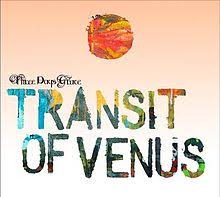REVIEW: Transit of Venus

Forgive me, dear reader, as I start this review with a bit of a tirade.
One of the problems I have with music (and any medium of entertainment that reaches a large enough audience) is the uncountable amount of opinions that are shared by people who have no idea what they’re talking about.
This leads into my next point about how, out of all the terms that get thrown at musicians, none are as grating as the term “Sell-out.”
You hear it all the time. “This band sold out!” Or my personal favorite, “They’re in it for the money now,” as if they weren’t in it for the money from the get-go.
Most of the time, the term “Sell-out” is thrown around because one simply doesn’t like some aspect about the band.
Maybe they decided to experiment with their sound. Perhaps they decided to introduce a different instrument to their palate such as the synthesizer, a hallmark of a rock band “selling out.”
And this leads me to Three Days Grace’s Transit of Venus.
Released October 2, 2012, the album was received positively by critics; however, the album was divisive among fans, mostly because of the inclusion of electronic elements on this senior effort.
And I’m not making that up, either. I scrolled through the iTunes reviews to see seemingly endless one-star “reviews” calling the album disappointing.
I even read a review in which the author stated that Three Days Grace pulled a “Linkin Park” on this album, abandoning their sound and selling out.
Of course, most of those reviews were from people who listened to the lead single, heard a synth bassline and wrote the album off without giving it a fair shake.
But that’s why I’m here. To dive into this supposed atrocity and find out whether or not these claims of selling out are true, or if they’re just the baseless whines of musical reactionaries crying wolf.
Let’s get started!
First on the list is the album’s presentation, which is done very well.
The cover has a peach-to-white gradient in which the album title and a circle are hollowed out, allowing the case that holds the disc to fill those spaces in with a variety of colors.
Once you pull the case out, you are treated to a truly weird piece of art.
But weird in a good way.
From buildings floating up into the air, to a grey-skinned girl with a white halo, it is very reminiscent of an urban graffiti mural with the amount of colors and spray painted look.
It’s creative and cool to look at, as an album cover should be.
Moving on to the instrumentation, Three Days Grace do introduce new instruments such as keyboards and synthesizers on this album, and they use them to great effect whilst not overdoing it.
In fact, one of Transit of Venus’ greatest strengths is this willingness to experiment musically, ergo the electronics.
This skillful incorporation is also indicative of their musicianship as a whole, it’s very refined and matured.
They boiled it down to a science — they know what to do and when to do it.
This shows growth and progression, and those are attributes that should always be appreciated.
And for all the talk of selling out, they certainly do show restraint in regards to the electronics as their use is only really noticeable in about three songs. Other than that, they stick to what they know.
It’s honestly regular Three Days Grace.
Gontier still shouts the song title over and over in the chorus and the guitars, bass and drums are on par with past albums, just now there may be a keyboard or a synthesizer being used.
While I’m on the topic of the instrumentation, it’s also immediately noticeable just how atmospheric this album is.
As soon as album opener “Sign of the Times” begins, you’re treated to well-placed guitar chords, a thick bassline and Gontier’s unusually melodic vocals which invoke a somewhat introspective and melancholic sound.
And that’s a sound that is prevalent (at least instrumentally) throughout the album, especially on songs like “Operate” and “Anonymous.”
There’s just an air of poignancy that surrounds this album, at least to me.
But that may also be due to this being Gontier’s last creative effort with the band.
His departure truly did shake up the music world a little bit, at least in regards to rock; I feel that many also unfairly blame the album and see it as the catalyst for said event.
There are a lot of positives to this album, but I’d be lying if I said it didn’t have any dings and dents, and it mainly manifests in the lyrics.
Three Days Grace have always worked well with simplicity, both lyrically and musically, but there are some lyrics here and there that feel like they could have used more time on the floor to iron out some of the kinks.
For example, from “Operate” we have:
“Cut out my heart and you leave me bleeding / You are the only one who brings out the demon.”
The song is solid musically, but lines like that make me think they could have done better.
Another example, from “Give Me a Reason,” and this is the only truly bad lyric on this album:
“…like a vulture on a deer hit by a car.”
Seeing that line written out on paper is honestly making me laugh because of how ridiculous it is. I mean, they didn’t have to say how the deer died, as saying that a vulture is eating it already implies that it’s dead.
Although this album does contain some great lyrics as well, from “Time That Remains,” we have:
“The time is gonna come / You’ll wake up and realize just how fast your life goes by”
It’s a simple line, but its ever-present truth has stuck with me since I first heard it.
Anyway, there really isn’t much else to complain about on this album. Three Days Grace show a willingness to break their mold, but they don’t so much “break” it as “expand” it.
They didn’t adapt their sound to the new elements, they adapted the new elements to their sound; they’re still the same as far as design goes.
Overall, any perceived weakness this album has is quickly overcome by its strengths, and the odd mediocre lyric is nothing but a small tarnish on the shine that is Transit of Venus.
Final Rating: A-
I feel that, in more ways than one, Transit of Venus is somewhat of an island unto itself.
It’s different enough from its preceding albums to stand apart, due to its inclusion of electronics, and by virtue of Gontier’s departure after this album released, it stands apart from its succeeding albums.
The electronic elements alone seem to have been enough to turn this album into the “black sheep” of the Gontier-era albums, which causes it to be overlooked.
And that’s truly unfortunate, because underneath the “controversy” per se lies a solid album in which Three Days Grace continued to explore their musical boundaries.
I do not know how the members themselves feel about the album, but I would hope they’re proud of it. It may not be their most lyrically “hard-hitting” or musically “raw” album, but its strengths are worthy of praise and admiration nonetheless.
In the end, I’d definitely recommend giving Transit of Venus a listen.














